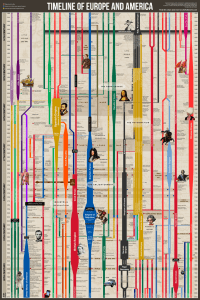Tags
Breaking Bad, Colleagues, Eric, Graduate School, Indoctrination, Marxism, Mentoring, Pitt, Politics of Academia, Racism, Walter White, White Privilege

All these years with this blog and I’ve never written about the first of the people who came into my life and decided that I needed their tutelage about grad school and life in general. Because of people like him, despite their helpfulness, I always have found myself leery about people telling me that they will “mentor me” or about calling myself a mentor of any kind. It should be the type of process that happens organically, based on mutual respect and trust, and not just because one person is a generation or more older than the other person.
The first person to volunteer themselves as a mentor during my first year as a graduate school in the University of Pittsburgh’s History department was Eric, who was 42 or 43 to my 21 year-old self in September 1991. A year and a half earlier, Eric was the teaching assistant for my upper-level American Working-Class History course with Dick Oestreicher. We had exactly two interactions that semester. One was when Eric had scored my midterm exam short essays an 89. I asked him, “So, what’s the difference between an 89 and a 90 on this exam, anyway?” His mouth fell open, because he didn’t have an answer. He changed my grade to a 90 on the spot. Two was at a going-away party for my TA from my Western Civ II course my first year at Pitt, Paul Riggs. Paul was headed to Edinburgh, Scotland on fellowship to explore the height, weight, and diet differences among 18th and early 19th century European men in connection to a larger econometrics dissertation. (I still don’t quite know what Paul’s dissertation was about, beyond half-starve British and French soldiers hoping to grow to five-three before dying from bayonets or typhoid during the Napoleonic Wars.)
It just happened that when administrators assigned me a cubby hole for a desk my first year in grad-school-land, that it was in the same part of the department as Eric’s cubicle. His spot included a window that looked out from the third floor of Forbes Quadrangle (now Wesley Posvar Hall) to the open space below, as well as to Hillman Library, David Lawrence Hall, and if you tilted your head to the right, Carnegie Library of Pittsburgh and the lower floor of the Cathedral of Learning. It was a prime spot, and Eric never hesitated to let me or anyone else know that he had earned it.
Eric had, in fact, earned it. He became a grad student in the department at the same time Pitt had awarded me an academic scholarship to attend as an undergrad, in 1987. He bragged about the fact that he had gone from having “only an Associate’s Degree to ABD in just three years.” Pitt had also rewarded Eric an Andrew W. Mellon Dissertation Fellowship in 1990, making it seem he was on “cruise control” for finishing his doctorate in a couple of years.
What I’d learn about Eric over the next two years was that he was also a very active Marxist, a card-carrying member of the Community Party USA (or, maybe, if I’m remembering it wrong, the Socialist Party USA), and a trained actor who had made documentaries and written for news rags about union-busting, union-organizing, and class struggle since the mid-1970s. This would appeal to the powers that were in the department (including Oestreicher, his dissertation advisor), a place that privileged Marxist and neo-Marxist thought above all else.
The acting and other public-facing work made Eric a stand-out pontificator, but was also where his open declaration of his “mentoring” of me irritated me a helluva lot. Many times during our two years together in the same department, Eric would interrupt me in the middle of a conversation with a peer, or when reading a book before class, or when I was prepping to TA, or otherwise just working away on a research project. It was usually with articles on a topic different from my research on multiculturalism or with an issue he wanted to debate me on. Sometimes, these interruptions and distractions I welcomed, maybe even, needed. But so many times, not so much.
Eric accused me on several occasions of having “a chip on [my] shoulder.” Maybe I did have one, mostly about the erasure of anything on American race and racism by the Marxist set in the department. Eric, though, was the proverbial pot-meet-kettle type. His chip made mine look like a speck. Looking back, Eric reminds me a bit of Bryan Cranston’s Walter White from Breaking Bad. Both he and the fictionalized White could not see how their sense of white male privilege shaped their worldview and their interactions with people. In my case, Eric assumed that I sometimes asked him a question or sought his advice as a sign that I needed mentoring, when in my mind, I was just asking a question or seeking an opinion from whomever was around at 9 pm on a Thursday night.
But nothing piqued Eric’s interest in me more than his attempts to make me into a Marxist. “Racism is a byproduct of dialectic materialism” or “capitalism,” Eric would sometimes say (or at least, as much as I can remember him saying). This line of whitemansplaining I had heard in less sophisticated circles years ago. I never told Eric about all my arguments over the years with my Humanities classmate JD, but it probably wouldn’t have mattered if I had. Eric was deep into his cups of Marxist wisdom, deep enough to ignore my counterarguments. “You cannot understand inequality in America without also accounting for racism,” I often said. I did enjoy these debates, at least at first. By my second semester, and especially by my second year, I was weary.
I didn’t see Eric much the second half of the 1992-93 school year (this as I prepared to transfer from Pitt to Carnegie Mellon to battle with privileged-white-privileged, ass-kissing center-right fake Marxists). I guess that was when he finally sat down to write his dissertation, though it would be a number of years before Eric would complete it to his doctoral thesis committee’s satisfaction.
I wouldn’t have learned about the good qualities of Rolling Rock or explored hard apple cider without his encouragement. But, as intriguing as these arguments with Eric could sometimes be, I longed for being understood, for people who took the centrality of racism to everything that is the US and the West seriously. It would be a long time before I’d find people like me in this life.













